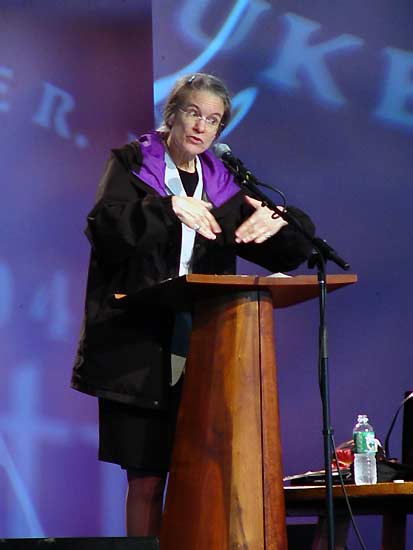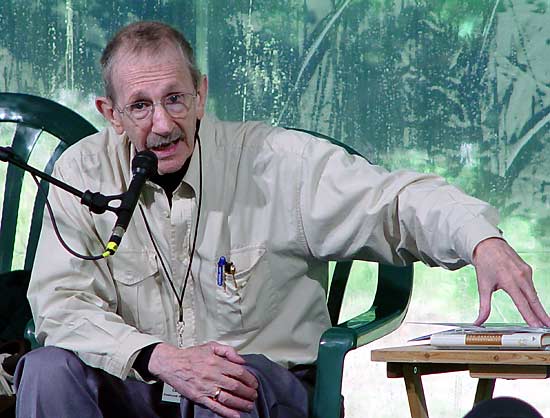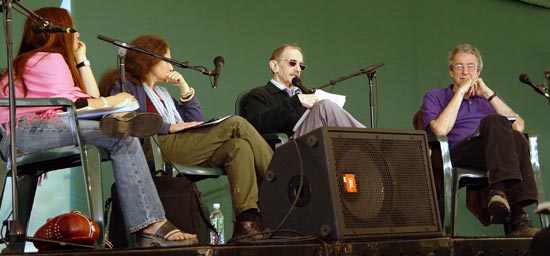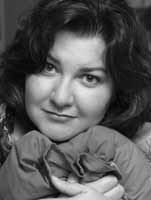October 1, 2004
Dodge Report. Friday October 1st
Made it! Whew! I'm in the Main Stage Tent listening to Sharon Olds read her work. It's supposed to be a conversation about Poets on Poetry, but we came late and I don't mind listening to her at all. Just a tad disappointed not to hear her speak about craft.
 Let me back up and talk about the MUD! They don't seem prepared for this damp.
The ground is soaked! They've sprinkled hay to make trails passable, but it's
really bad. Everyone has mud slung up around their shoes and ankles. It reminds
me of a State Fair. The crowds aren't as bad as I thought they would be. Everyone
is pretty calm, contemplative even. Lots of gray hair and balding heads. (Note
to self: remember to write a poem about underwear) There are more women than
men, but not by too much. (More specifically, write a bra poem) Lots of younger
people, too, I'm happy to say. This is just a poet's wet dream. Too bad we
can't be 5 places at once and see everyone we'd like to see. The choices are
tough. The tent is filling up with Billy Collins fans. He's up
next in here. What! Just found out he's sick, has just been released from the
hospital and won't
be here until Sunday. And that's a BIG maybe. Thank goodness for my backup
plan. I know exactly who to see.
Let me back up and talk about the MUD! They don't seem prepared for this damp.
The ground is soaked! They've sprinkled hay to make trails passable, but it's
really bad. Everyone has mud slung up around their shoes and ankles. It reminds
me of a State Fair. The crowds aren't as bad as I thought they would be. Everyone
is pretty calm, contemplative even. Lots of gray hair and balding heads. (Note
to self: remember to write a poem about underwear) There are more women than
men, but not by too much. (More specifically, write a bra poem) Lots of younger
people, too, I'm happy to say. This is just a poet's wet dream. Too bad we
can't be 5 places at once and see everyone we'd like to see. The choices are
tough. The tent is filling up with Billy Collins fans. He's up
next in here. What! Just found out he's sick, has just been released from the
hospital and won't
be here until Sunday. And that's a BIG maybe. Thank goodness for my backup
plan. I know exactly who to see. Side note: Poets are really into dissing Billy. Not in a bad way, but more in a snickering way. He IS the stand-up poet. Makes people laugh, makes people sigh. It's inevitable. Even if some are sighing with a roll of the eye. Me, though, I see there's enough pain in the world and love the way Billy makes me see the beautiful and bittersweet side of life. You know, he is the reason I came here and I'm allowing myself to be bummed for about two minutes that he's not. There that's done, then. Hell, I'm not even wondering how he is or if he's okay. So selfish of me. Anyway, now I'm over it and am happily heading off to see Philip Levine talk about Poets on Poetry.

Philip Levine is great. He's funny and harsh. He talks about when he was a teacher making his students cry. Of course, I wonder at their potential and wonder how he would have reacted to my work. Would I have cried? As an underclassman, I'm sure of it. He says out of all the students he taught his favorites were from Cal State at Fresno. He says this is because none of them ever cried. He sees the reason for this because they were used to failing and it was no surprise to them to then fail. Whereas, the kids from the prestigious schools were more used to perfection. Something like that. I'm condensing.
Both he and Sharon talk about the idea of it taking a load of bad poems to write good ones. Here's a quote from Philip: "There's always going to be a lot of bad poems in great poets." I'm paraphrasing Sharon here: When you draft a poem, no one will ever see it. Unless you go back and type it up. But to write it down doesn't take bravery. If in the middle of the poem music enters, it's luck. The truth enters to allow us to cross the line. That's art. Enough air, clarity, light enters to want to share it.
I don't see it the same way, I suppose. But I'm still young to this. I see a lot of poems don't go anywhere, but I don't call them "bad." Or think of them particularly. They don't scar me or scare me in any way. They are just what they are: fodder. I can't get to the "great" stuff without them. But I still hold a fondness for my creative process. I'm not so jaded. I take that back, there are some poems I wrote as a young teenager that I am mortified of. But they're still dear to me. The worst being a poem about a man getting arrested and wondering who was going to feed his fish. I'm always that person who wonders what's going to happen to the family pet when someone dies in a movie. Such a sap, I know it.
What else? Lunch was fine. Big tent, big crowds. Coldish food. But when you're hungry, anything tastes good. They had pizza, hoagies, salads, hamburgers, and hot dogs, etc. We sat with some poetry groupies. One who was a veteran and knew everything about all the poets. She's going to George Mason and was sure I'd never heard of it. I had. She was speaking about low res and "high res" (what I call full-time school) and the benefits of each. She thinks it's so beneficial to be able to be in a community of writers and see how they're writing grows over the two years together. Yes, but I can't go anywhere. I'm married and reside in San Francisco. So, she says, I need to be dedicated enough to stick to the lonely deadlines. I think I could do it. I just don't know where I am right now as far as wanting feedback is concerned. I'm not even sure about my output. One good poem a month is good enough for me. (There I go with the good/bad fallacy.) How about: one strong poem per month, instead. I'm really at this point tuning in to the words, the word choice, listening for that inner music and learning what pleases MY ear. I feel it's imperative for me to know this first, before I share my work with others for criticism. So I won't cry. Ha! No, so I know my why's and wherefore's.

Lastly, I went to see a panel discussion called: Poetry as Disruptive Seed/as Centering Force with Marilyn Chin, Jane Hirshfield, Philip Levine, and C.K. Williams. Mostly they discussed how the didn't really get the meaning of the discussion. Marilyn interpreted it by reading 25 brash haiku's, Jane saw it as the difference between poems that console and poems that distress. The obvious choice is to want to "distress" rather than console, obviously. But she made a good point, that it's out of our hands and in the hands of the reader what will console and what will distress. I thought that was a really good point. And part of why it's important to get our poems out there and let them live there own lives separate from us. Philip says we need to meet the urgency with whatever craft we've amassed. Disruptive versus calm, soothing. C.K. thought that the term "centering" was new age and balked against it. He read a "disruptive" poem by Philip Larkin called This Be the Verse.
The conversation turned, of course, to the state of the world. How could it not with poetry as "disruptive seed." Levine says it's years before we'll be able to write about this. Says Yusef is just now writing his "good stuff" about his war experience. Chin quoted Auden: "Poetry Makes Nothing Happen." CK talks about read-ins during the Vietnam war being one of the first forms of protest about war, but probably having no effect. Philip says the same people who architect the war are those who decide to end it because it isn't profitable anymore. Jane says Ceylon wrote, "Say out what you say." And it is everyone's responsibility to "say out what you say." There could be a cultural evolution that spurned from just one outcry. That one touches another and another and soon a change in consensus transpires.
Now I'm back in my hotel having a glass of wine and something to eat. We will get there even earlier tomorrow. Oh, one thing I notice is the sound of frogs and crickets. How I miss that natural "noise"!
Posted by mybluemuse at October 1, 2004 5:58 PM
|

